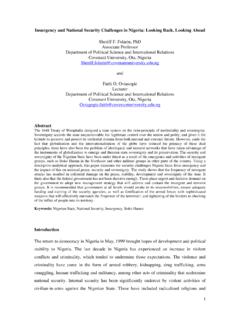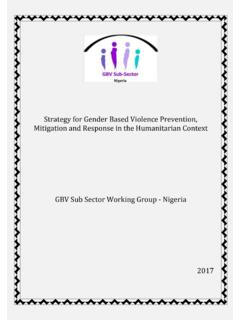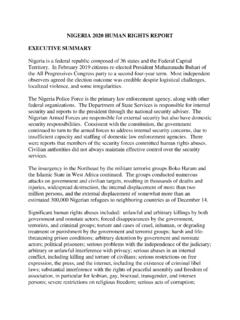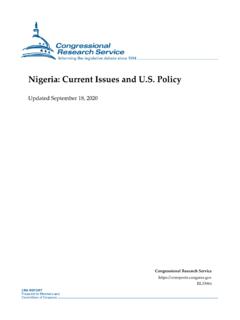Transcription of How Corruption Contributes to Poverty
1 1 How Corruption Contributes to Poverty1 By Prof. Olu Aina, OFR, 2 ICPC, Abuja 1. ABSTRACT There is widespread perception, even among street people, and development agencies (World Bank and USAID), that Corruption is generally the cause of Poverty . The topic of this paper, which was suggested by the Organizers of this Conference, also says that much. Though literature abounds on this subject, there is, as yet, no empirical evidence or unanimity among scholars to support the hypothesis that Corruption is responsible for Poverty even though, it is generally agreed that Corruption fuels Poverty ! The views therein have, however, raised relevant issues in the discourse, analyses, and classifications of the phenomena relating to Corruption and Poverty .
2 These views range from the definitions, classifications, and characterization of the twin topics depending on the perspective, economic or governance, from which they are viewed. This paper accordingly attempts to review existing literature on the subject of Corruption and Poverty . The issues generated by the review are related to what is on ground in Nigeria the largest economy with seemingly the largest number of poor people in Africa. It concludes with the anti- Corruption programmes which the Independent Corrupt Practices and Other Related Offenses Commission (ICPC) has crafted (especially since 2011) to address issues of economic growth, accountability in governance and governance services, education, and public trust in government which are believed to not only reduce Corruption but reduce Poverty as well.
3 1 Being paper presented at the International Conference on Development of Social Enterprise and Social Business for Eradication of Extreme Poverty and Street Begging, holding at Chittagong, Bangladesh, December 19-20, 2014. 2 Prof Olu Aina, OFR former Head of Department of Vocational and Technical Education, Ahmadu Bello University, Nigeria, Pioneer CEO, National Business and Technical Examinations Board, Nigeria, is currently Executive Member, Independent Corrupt Practices and Other Related Offenses Commission (ICPC), Nigeria. 2 2. INTRODUCTION Nigeria has made significant economic advances in recent times.
4 Over the last decade or so, the country has managed to sustain an economic growth rate of about 6-7%. This data meant that Nigeria not only grew far above the sub-saharan average of , but was also the third fastest growing economy in the group of 10 emerging markets referred to as EM10, behind only China and India. Such rapid economic growth enabled the country to lip-frog from an economy of $46 billion USD in 2000 to an economy of $264 billion USD in 2013 (Enweremadu, 2013). Following a recent rebasing, the size of the economy soared to $ 509 billion USD by the end of 2013, making it the largest economy in Africa. This rapid growth in GDP has brought two major effects.
5 First Nigeria s per capital income has increased from about $500 USD in 1999 to nearly $3000 at the end of the rebasing exercise in 20133. Secondly, there has been a revitalization of Nigeria s middle class. Indeed, two studies carried out in 2007 and 2010 put the size of the country s middle class as 16% and 30% of the population respectively (Ibid), which either way, would still represent significant progress giving that the country s middle class had almost vanished at the end of the 90s follow a disastrous Structural Adjustment Programme launched at the behest of the World Bank and IMF. Yet, such improvements in macroeconomic statistics have however not pleased many Nigerians who questioned the relevance of an economic growth which has until now failed to translate into a reduction of Poverty or increasing standard of living for a vast majority of Nigerians.
6 Despite a multiplicity of Poverty alleviating programmes and policies, Poverty remain wide spread in contemporary Nigeria (Appleton et al., 2008). Indeed, as a 2014 World Bank report noted, the country s performance is at odds with the general international trend of Poverty reduction, in particular in other countries experiencing rapid 3 Nigeria s economic past was characterised by decades of weak economic growth (Okonjo-Iweala and Osafo-Kwaako, 2007) and massive decline in living standards (Appleton et al., 2008). Over the period 1960 to 2000, annual GDP growth averaged about (World Bank, 2009).
7 Juxtaposed with an average population growth above 3% per annum, it implied a zero growth rate in per capita GDP over the years that resulted in a deterioration of living standards for most citizens. 3 economic growth like Nigeria (World Bank, 2014; 16) . For sure, the issue of Poverty is not a new phenomenon in Nigeria. Almost all previous regimes have contended with the issue. By mid 1999, for example, when the country returned to democratic rule, the percentage of people who were considered to be below the Poverty line (leaving on less than $1 USD per day) was estimated to be as high as 70% (Sela-i-martin and Subramanian, 2008). In recent times, however, the problem is receiving more serious attention of policy makers in Nigeria.
8 This point was brought home following the devastating youth militancy in Nigeria s oil producing Niger Delta region and more recently the violent insurgency in the impoverished North Eastern region where a radical Islamic sect, known as Boko haram , has decreed a Muslim caliphate killing at least 13000 in the process. Most Nigerians will easily blame the high rate of Poverty in the country for these conflicts. Although the nigerian government has often disputed the claim that Poverty is increasing in the country, and what constitute the actual Poverty rate in Nigeria today remains a subject of considerable debate among development agencies and scholars, most statistics show that, indeed, Poverty levels in Nigeria is unacceptably high.
9 For instance, official data published by Nigeria s National Bureau of Statistics shows that percentage of Nigerians living in abject Poverty , calculated on $1 USD per day, based on an adjusted purchasing power parity, had increased from in 2004 to % in 2010 (National Bureau of Statistics, 2012). A recent report by the World bank figures suggests that Poverty rates in Nigeria are significantly lower than estimates based on the 2009/2010 NBS study. In the Banks view, per capita Poverty rate registers at and percent of the population in 2009/2010 and 2012/2013, respectively (World Bank, 2014: 17). This is still very high considering that Nigeria is a huge country.
10 According to the World Bank, Nigeria with 7% of the world s poor people now ranks as the third largest contributor to the worlds Poverty figures, next to China (13%) and India (32%) (Ogunbiyi, 2014). The contradiction of rising Poverty in a rapidly expanding economy has made nigerian commentators to support the general hypothesis that Corruption leads to Poverty , or at least Contributes to it substantially. According to this hypothesis, Corruption manifests in many forms of waste and misallocation of resources by government officials which denies the down-trodden of vital social 4 services and infrastructures, indirectly fueling Poverty .




